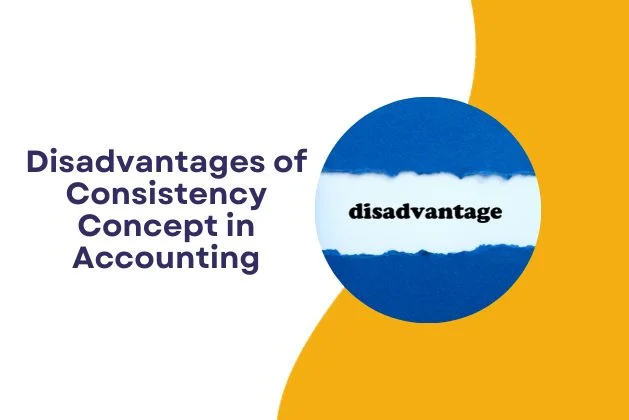Table of Contents
ToggleIntroduction
The Consistency Concept in Accounting holds significant importance in the field of accounting.
It serves as a foundational principle that guarantees the reliability, relevance, and comparability of financial statements across time.
This accounting principle revolves around the adoption of consistent and uniform guidelines and procedures for recording similar transactions or events in a standardized manner.
The application of consistency in accounting enables businesses to uphold precise and current record-keeping practices, ensuring the delivery of accurate and impartial financial information to its audience.
For accountants, a thorough grasp of the Consistency Concept in Accounting is imperative.
It plays a pivotal role in safeguarding the precision of financial data while mitigating the potential distortion of financial statements.
By employing consistent methods to recognize transactions or events spanning various timeframes, organizations can compile information that readily lends itself to temporal comparisons.
Ultimately, the Consistency Concept in Accounting empowers stakeholders, including investors, creditors, and regulatory bodies, to gain a more comprehensive and predictable understanding of a business’s performance.
In the end, organizations must prioritize the principle of consistency when crafting financial statements.
This commitment ensures the provision of precise data that mirrors a business’s authentic performance, while concurrently preventing any misrepresentation or distortion of critical figures resulting from the use of inconsistent approaches across different time periods.
By actively embracing Consistency Concept in Accounting reporting methods, organizations can cultivate trust among their stakeholders by delivering financial information that is dependable and pertinent.
Advantages of Consistency Concept in Accounting

The consistency concept in accounting offers several advantages, which are essential for maintaining the accuracy and reliability of financial information. Here are some of the key advantages:
Comparability: Consistency allows for easy comparison of financial data across different time periods.
When similar transactions are recorded using consistent methods, stakeholders can analyze the performance and financial health of a business over time, making it easier to identify trends and patterns.
Reliability: Consistency Concept in Accounting enhances the reliability of financial statements.
When accounting practices remain consistent, it reduces the likelihood of errors and misstatements, ensuring that the financial data accurately represents the business’s financial position and performance.
Relevance: Financial information remains relevant when the Consistency Concept in Accounting
is applied.
Users of financial statements can rely on consistent data to make informed decisions about investments, loans, and other financial matters.
Transparency: Consistency Concept in Accounting promotes transparency in financial reporting.
It allows stakeholders to have confidence that financial data is not manipulated or distorted by changing accounting methods or principles.
Reduced Bias: By following consistent procedures, organizations can minimize bias in financial reporting. This helps prevent the manipulation of financial data to portray a more favorable image of the company’s performance.
Improved Accountability: Consistency Concept in Accounting holds organizations accountable for their financial reporting practices.
It encourages adherence to established accounting standards and principles, reducing the potential for unethical or misleading financial reporting.
Legal and Regulatory Compliance: Many legal and regulatory requirements mandate the use of consistent accounting practices.
Adhering to the consistency concept ensures that a company remains in compliance with these requirements, reducing the risk of legal issues.
Investor and Creditor Confidence: Investors and creditors are more likely to have confidence in a company’s financial statements when they are prepared with consistency.
This confidence can lead to increased investment, access to credit, and better financial relationships with stakeholders.
Sustainability: Consistency Concept in Accounting helps organizations maintain sustainable financial practices.
It prevents abrupt changes in financial reporting that could lead to financial instability or uncertainty.
Disadvantages of Consistency Concept in Accounting

While the consistency concept in accounting offers numerous benefits, there can also be some potential disadvantages or challenges associated with its strict application:
Rigidity: Strict adherence to Consistency Concept in Accounting may lead to rigidity in accounting practices.
This could hinder an organization’s ability to adapt to changing business environments or evolving accounting standards. For instance, it may limit the ability to adopt more appropriate or innovative accounting methods.
Lack of Flexibility: In certain cases, consistent application may not allow for flexibility when dealing with exceptional or unique transactions or events.
This can result in financial statements that don’t accurately reflect the economic substance of certain transactions.
Stale Accounting Practices: Over time, consistent practices may become outdated or less relevant due to changes in the industry or the business itself.
Relying on outdated practices can lead to financial statements that don’t accurately represent the current financial position or performance of the company.
Complexity: Maintaining consistency across various accounting standards and principles can be complex, especially for multinational corporations operating in multiple jurisdictions.
This complexity may require significant effort and resources to ensure compliance with different accounting requirements.
Reduced Decision-Making Flexibility: Strict consistency can limit an organization’s ability to tailor its financial reporting to meet the needs of specific stakeholders.
This could impact the ability to communicate financial information effectively to different user groups.
Potential for Misrepresentation: In some cases, the strict application of consistency may inadvertently lead to the misrepresentation of financial results. For example, if a particular method consistently understates or overstates the financial position, this bias can persist over time.
Inhibiting Innovation: An excessive focus on consistency may discourage organizations from adopting new and more relevant accounting methods or technologies that could enhance financial reporting accuracy and transparency.
Complex Transition Periods: When transitioning from one consistent accounting method to another (e.g., due to a change in accounting standards), it can be challenging to ensure a smooth and transparent transition without causing confusion among stakeholders.
Examples of Consistency Concept in Accounting

The consistency concept in accounting is applied in various ways across different accounting principles and practices. Here are some examples of how the consistency concept is implemented:
Depreciation Method: Suppose a company Consistency Concept in Accounting uses the straight-line method to depreciate its assets, such as buildings and machinery.
This means that it allocates the same amount of depreciation expense each year over the asset’s useful life. The consistency concept requires the company to continue using this method unless there is a valid reason for changing it.
This ensures that the depreciation expense is consistently applied from year to year for comparability.
Inventory Valuation Method: If a company consistently values its inventory using the First-In, First-Out (FIFO) method, it should continue to use this method to value its inventory in subsequent periods.
Changing to a different method, such as Last-In, First-Out (LIFO), would require a clear and justifiable reason, and the impact of the change should be disclosed in the financial statements.
Revenue Recognition: The consistency concept also applies to how revenue is recognized. If a company consistently recognizes revenue when goods are shipped, it should maintain this practice unless there’s a valid reason to change it.
Changing the revenue recognition method could affect the timing and amount of reported revenue, impacting comparability.
Financial Statement Presentation: The Consistency Concept in Accounting concept extends to how financial statements are presented.
For example, if a company has been presenting its financial statements in a particular format, it should maintain that format to facilitate year-to-year comparisons. Changes in the format should be made only if they improve the clarity and understanding of the financial statements.
Measurement Units: Consistency in the measurement unit is crucial. If a company reports its financial results in a particular currency (e.g., US dollars), it should consistently use that currency for all financial reporting purposes.
Switching to a different currency could introduce currency-related fluctuations that affect the comparability of financial statements.
Tax Accounting: In tax accounting, consistency is vital as well. A business that consistently applies certain tax accounting methods should generally maintain this consistency unless permitted by tax regulations to make a change.
Accounting Policies: Consistency in accounting policies is fundamental. A company should consistently apply the same accounting policies for similar transactions and events.
For example, if it capitalizes development costs for one project, it should consistently apply this policy to all relevant projects.
In each of these examples, the consistency concept ensures that similar transactions and events are treated in a uniform and standardized manner from one period to another.
This, in turn, promotes reliability, comparability, and transparency in financial reporting, which are essential for stakeholders’ understanding and analysis of a company’s financial performance.
Challenges in Maintaining Consistency Concept in Accounting

Maintaining the consistency concept in accounting can be challenging due to various factors and circumstances. Here are some of the challenges organizations may face when trying to uphold consistency:
Evolving Accounting Standards: As accounting standards and regulations change over time, organizations may need to adapt their accounting practices to remain compliant.
This can be challenging as new standards may require adjustments to existing practices, potentially leading to inconsistencies.
Business Changes: Businesses evolve, and their operations may change. New products or services, mergers, acquisitions, or changes in the industry can necessitate adjustments to accounting methods and principles.
Maintaining consistency while accommodating these changes can be difficult.
Technological Advancements: Advances in technology can offer more efficient and accurate accounting methods.
Organizations may be tempted to adopt new technologies, but doing so while ensuring consistency with existing practices can be challenging.
Global Operations: Multinational organizations may face challenges in maintaining consistency across different countries with varying accounting standards and regulations.
Adhering to global consistency while complying with local requirements can be complex.
Legal and Regulatory Changes: Changes in tax laws, reporting requirements, or other regulations may force organizations to alter their accounting practices, potentially leading to inconsistencies.
Audit and Review Findings: External auditors and internal reviewers may identify errors or inconsistencies in accounting practices during audits or reviews.
Addressing these issues while maintaining historical consistency can be a delicate balance.
Materiality Thresholds: Decisions about when to change accounting methods or policies often depend on materiality thresholds.
Determining what is material and when a change should be made can be subjective and challenging.
Financial Reporting Fraud: Organizations may sometimes engage in financial reporting fraud, intentionally manipulating financial statements to appear more consistent than they are.
Detecting and preventing such fraud is an ongoing challenge in maintaining true consistency.
Complex Transactions: Certain complex transactions, such as mergers, divestitures, or restructurings, can introduce complexities in accounting treatment.
Ensuring consistency while addressing these complexities requires careful consideration and documentation.
Management Changes: Changes in management can bring new perspectives and approaches to accounting practices. New leadership may choose to depart from previous practices, potentially affecting consistency.
Investor and Stakeholder Pressure: Pressure from investors, analysts, or other stakeholders to achieve specific financial targets or present financial results in a certain way can lead to deviations from consistent accounting practices.
Strategies for Achieving and Maintaining Consistency Concept in Accounting
Achieving and maintaining consistency in accounting is essential for accurate and reliable financial reporting. Here are some strategies to help organizations achieve and maintain consistency:
Document Accounting Policies and Procedures: Clearly document your organization’s accounting policies and procedures in an accounting manual or policy document.
This documentation should outline how transactions are to be recorded, what accounting methods are used, and how financial statements are prepared.
Training and Education: Ensure that your accounting staff receives proper training and education on accounting principles and the organization’s specific policies. Regular training can help maintain a consistent understanding of accounting standards and practices.
Regular Review and Update: Periodically review and update accounting policies and procedures to ensure they remain in line with current accounting standards and regulations.
This is particularly important when there are changes in accounting standards or significant changes in the business.
Segregation of Duties: Implement strong internal controls and segregation of duties to prevent unauthorized changes to accounting records.
This helps maintain the integrity of financial data and ensures that consistency is not compromised through unauthorized alterations.
Engage with External Auditors: Work closely with external auditors during the audit process.
Auditors can provide valuable insights into whether the organization’s accounting practices are consistent with industry standards and regulations.
Consistency in Classification: Consistently classify transactions and events. Ensure that similar transactions are categorized and recorded in the same way each accounting period. This includes consistency in revenue recognition, expense categorization, and asset/liability classification.
Materiality Considerations: When considering changes in accounting policies or methods, assess the materiality of the change. Small changes that are not material may not require immediate adjustments.
Transparency and Disclosure: Clearly disclose any changes in accounting policies or methods in the financial statements and footnotes.
This transparency informs stakeholders about any variations and the reasons behind them.
Management Oversight: Maintain active oversight by management to ensure that accounting practices are consistent and compliant with established policies.
This oversight can include regular reviews, approvals, and reconciliations.
Consistency Across Reporting Periods: Ensure that accounting practices and methods remain consistent from one reporting period to another.
Avoid making changes to accounting methods unless there is a compelling reason to do so and provide proper disclosure when changes occur.
Document Changes: If changes to accounting policies or methods are necessary, document the rationale behind these changes and seek input from experts or external advisors.
This documentation helps justify and explain the decision to stakeholders.
Periodic Internal Audits: Conduct periodic internal audits to assess the organization’s adherence to accounting policies and procedures.
This can help identify and rectify any inconsistencies or deviations.
Use Accounting Software: Implement accounting software that enforces consistency in recording and reporting financial transactions.
These systems often have built-in controls that can help maintain uniformity.
Impact of Regulations on Ensuring Accounting Consistency Concept in Accounting
Regulations play a significant role in ensuring accounting consistency. They are put in place to standardize accounting practices, promote transparency, and protect the interests of stakeholders.
Here are some ways regulations impact accounting consistency:
Standardization of Accounting Principles: Regulations, such as Generally Accepted Accounting Principles (GAAP) or International Financial Reporting Standards (IFRS), establish standardized accounting principles that organizations must follow.
These principles help ensure that similar transactions and events are accounted for consistently across different organizations and industries.
Uniform Reporting Standards: Regulations prescribe uniform reporting standards, including formats and disclosures for financial statements.
This uniformity ensures that financial statements are presented consistently, making it easier for stakeholders to compare financial data across different companies.
Consistent Revenue Recognition: Regulations provide guidance on revenue recognition, specifying when and how revenue should be recognized.
This consistency is crucial for businesses engaged in various industries to account for their revenue in a uniform manner.
Consistency in Expense Recognition: Regulations also dictate how expenses should be recognized, ensuring that organizations consistently record and report their operating costs and other expenses.
Disclosure Requirements: Regulations often include detailed disclosure requirements, such as notes to the financial statements, that mandate the disclosure of significant accounting policies, changes in policies, and other relevant information.
These disclosures promote transparency and help stakeholders understand the consistency of accounting practices.
Mandatory Audits: Regulations may require organizations to undergo mandatory financial audits by external auditors.
These audits help ensure that financial statements are prepared in accordance with established accounting standards and consistently reflect the organization’s financial position.
Regulatory Oversight: Regulatory bodies, such as the U.S. Securities and Exchange Commission (SEC) or the Financial Accounting Standards Board (FASB), oversee compliance with accounting regulations.
They enforce consistent application of accounting rules and may issue clarifications or interpretations to promote uniformity.
Consistency in Tax Reporting: Tax regulations often align with accounting regulations to ensure consistency in financial reporting for tax purposes. This helps prevent discrepancies between financial statements and tax returns.
International Consistency: Global organizations benefit from international accounting standards (IFRS) that promote consistency in financial reporting across different countries. This enables multinational companies to present financial data consistently to stakeholders worldwide.
Protection of Stakeholder Interests: Regulations are designed to protect the interests of stakeholders, including investors, creditors, and the general public.
Ensuring consistency in financial reporting reduces the risk of misleading or deceptive practices that could harm stakeholders.
Auditor Independence: Regulations often include rules to maintain auditor independence, ensuring that external auditors can objectively assess the consistency and accuracy of financial statements without undue influence from the organization.
Also Read: Investment Banks in India
Uses of Consistency Concept in Accounting

The consistency concept in accounting serves several important uses and purposes in financial reporting and accounting practices. Here are the key uses of the consistency concept:
Comparability: Consistency ensures that financial data is recorded and reported in a uniform manner over time.
This uniformity allows stakeholders to compare financial information across different periods, enabling them to identify trends, changes, and patterns in a company’s financial performance and position.
Reliability: Consistency enhances the reliability of financial statements. When accounting methods and policies remain consistent, it reduces the risk of errors, misstatements, or manipulation of financial data, making the financial statements more trustworthy.
Transparency: The consistency concept promotes transparency in financial reporting. It helps stakeholders understand that the accounting practices and methods used by an organization remain consistent, reducing confusion and increasing trust in the financial information presented.
Decision-Making: Stakeholders, including investors, creditors, and management, rely on consistent financial data to make informed decisions.
Consistency ensures that these decisions are based on comparable and reliable information, supporting effective decision-making.
Legal and Regulatory Compliance: Many accounting regulations and standards require organizations to maintain consistency in accounting practices.
Adhering to these requirements ensures compliance with legal and regulatory frameworks, reducing the risk of legal issues.
Credibility: Consistency Concept in Accounting enhances the credibility of an organization’s financial reporting. Stakeholders are more likely to have confidence in financial statements that are prepared using consistent accounting methods and policies.
Accountability: Consistency Concept in Accounting holds organizations accountable for their financial reporting practices. It encourages adherence to established accounting standards and principles, reducing the potential for unethical or misleading financial reporting.
Facilitates Auditing: External auditors rely on consistency concept in accounting practices to assess the accuracy and reliability of financial statements.
When accounting practices are consistent, it simplifies the audit process and helps auditors ensure compliance with accounting standards.
Sustainability: Consistency concept in accounting promotes sustainability in financial reporting. It prevents abrupt changes in financial reporting that could lead to financial instability or uncertainty.
Stakeholder Trust: Consistency Concept in Accounting builds trust among stakeholders.
When financial information is presented consistently, stakeholders are more likely to trust the organization and its management, leading to stronger relationships and a better reputation.
Creditworthiness: Lenders and creditors use consistent financial data to evaluate the creditworthiness of an organization. Consistency Concept in Accounting reporting helps organizations maintain access to credit and favorable lending terms.
Read About: Posting in Accounting
Importance of Consistency Concept in Accounting
The importance of the consistency concept in accounting cannot be overstated. It serves as a foundational principle that underpins the reliability, credibility, and usefulness of financial reporting. Here’s why the consistency concept is crucial in accounting:
Comparability: Consistency Concept in Accounting ensures that financial data is recorded and reported in a standardized manner over time.
This uniformity allows stakeholders to compare financial information across different periods, facilitating the identification of trends, changes, and patterns in a company’s financial performance and position. Comparability enables better decision-making and analysis.
Reliability: Maintaining Consistency Concept in Accounting practices enhances the reliability of financial statements.
When similar transactions and events are recorded using the same methods and policies, it reduces the risk of errors, misstatements, or manipulation of financial data. This reliability is essential for stakeholders who rely on accurate information to assess a company’s financial health.
Transparency: The Consistency Concept in Accounting concept promotes transparency in financial reporting.
It assures stakeholders that the organization’s accounting practices remain consistent, reducing confusion and increasing trust in the financial information presented.
Transparent financial reporting is crucial for building and maintaining trust with investors, creditors, and other stakeholders.
Effective Decision-Making: Stakeholders, including investors, creditors, and management, rely on consistent financial data to make informed decisions.
Consistency ensures that these decisions are based on comparable and reliable information, supporting effective decision-making. Inconsistent financial data can lead to poor decision-making and increased risk.
Legal and Regulatory Compliance: Many accounting regulations and standards require organizations to maintain consistency in their accounting practices.
Adhering to these requirements ensures compliance with legal and regulatory frameworks, reducing the risk of legal issues and regulatory penalties.
Credibility: Consistency Concept in Accounting enhances the credibility of an organization’s financial reporting. Stakeholders are more likely to have confidence in financial statements that are prepared using consistent accounting methods and policies.
Credibility is essential for maintaining positive relationships with investors, creditors, and the public.
Accountability: Consistency Concept in Accounting holds organizations accountable for their financial reporting practices. It encourages adherence to established accounting standards and principles, reducing the potential for unethical or misleading financial reporting.
Accountability ensures that organizations accurately represent their financial position and performance.
Facilitates Auditing: External auditors rely on Consistency Concept in Accounting practices to assess the accuracy and reliability of financial statements.
When accounting practices are consistent, it simplifies the audit process and helps auditors ensure compliance with accounting standards. This, in turn, enhances the quality of financial reporting.
Sustainability: Consistency Concept in Accounting promotes sustainability in financial reporting. It prevents abrupt changes in financial reporting that could lead to financial instability or uncertainty.
Sustainable financial reporting practices are essential for long-term business operations and stakeholder trust.
Stakeholder Trust: Consistency Concept in Accounting builds trust among stakeholders.
When financial information is presented consistently, stakeholders are more likely to trust the organization and its management, leading to stronger relationships, investor confidence, and a better reputation in the market.
Conclusion
Ensuring the Consistency Concept in Accounting of accounting policies is an essential principle applicable to organizations of various types, including governmental bodies and both for-profit and nonprofit entities.
The primary objective is to facilitate the comparability of financial statements across different reporting periods.
By adhering to this principle, organizations maintain uniformity in the application of accounting policies throughout their operations.
Any modifications to these policies are made transparently and disclosed. This approach simplifies the task of external stakeholders, such as investors and creditors, in assessing an organization’s financial performance over time by enabling accurate comparisons of financial statements across various timeframes.
The adoption of accounting standards offers several advantages for both auditors and accountants. The consistent application of these standards throughout the industry enhances the reliability and trustworthiness of financial statements from an auditor’s standpoint.
Accountants, on the other hand, benefit from the clear guidance provided by established standards, which instruct them on how to accurately record and process financial transactions.
Furthermore, these standards ensure that any alterations to accounting policies or procedures are comprehensively documented within the financial statements.
This documentation enables both auditors and accountants to readily identify and comprehend the ramifications of these changes.
When accountants endeavor to assess the retrospective impact of a change, they frequently encounter the challenging task of conducting numerous calculations. Decisions regarding whether to modify accounting policies and estimates to enhance accuracy in presentation and preparation entail intricate considerations and sometimes give rise to disagreements among involved parties.
This type of judgment call necessitates meticulous evaluation, as it can have far-reaching consequences for businesses and stakeholders alike.
To arrive at the most informed decisions, accountants must possess the ability to assess the potential effects of changes from multiple perspectives and carefully weigh all potential risks before arriving at a final determination.
Frequently Asked Questions (FAQs)
The consistency concept is a fundamental accounting principle that requires organizations to use the same accounting methods, policies, and procedures for similar transactions and events over time. It ensures that financial data is recorded and reported in a standardized manner from one period to another.
Consistency is important because it enhances the comparability, reliability, and transparency of financial statements. It allows stakeholders to make meaningful comparisons of financial data across different reporting periods, promotes trust in financial reporting, and reduces the risk of errors or manipulation.
Examples include using the same depreciation method for similar assets, consistently recognizing revenue when earned, maintaining uniform inventory valuation methods, and adhering to consistent tax accounting practices.
Yes, organizations can change their accounting methods, but it should be done with proper justification and disclosure. The impact of the change should also be reflected in the financial statements, and the reasons for the change should be explained to stakeholders.
Financial statement users rely on consistency to assess an organization’s financial performance and position over time. Consistent financial data allows them to identify trends and make informed investment or lending decisions.
Yes, accounting standards and regulations often mandate the consistent application of accounting principles. Organizations are generally required to follow established accounting standards (e.g., GAAP or IFRS) to ensure consistency in financial reporting.
Challenges include adapting to evolving accounting standards, managing changes in business operations, ensuring compliance with complex tax regulations, and addressing discrepancies or errors identified during audits.
Strategies include documenting accounting policies, providing training to staff, regularly reviewing and updating policies, maintaining strong internal controls, engaging with external auditors, and staying informed about changes in accounting standards and regulations.
Failing to maintain consistency can lead to inaccurate financial reporting, reduced trust from stakeholders, legal and regulatory issues, and difficulties in making meaningful financial comparisons.
While consistency is crucial, there is some flexibility in accounting. Organizations can adapt to changing circumstances, but changes should be well-justified, properly disclosed, and transparent to stakeholders. Materiality is also a consideration in determining when changes are necessary.



